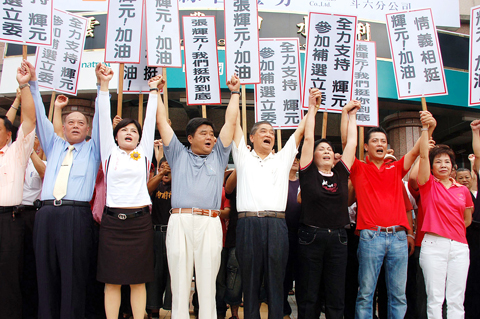Former Chinese Nationalist Party (KMT) legislator Chang Sho-wen’s (張碩文) father completed the registration process to run in the Yunlin County by-election yesterday morning, vowing to finish Chang’s term as a legislator.
Chang Sho-wen, who won a regional legislative election in Yunlin County in January last year, lost his seat earlier this month after the High Court found him guilty of participating in a vote-buying scheme organized by his father and annulled the election result.
Chang Hui-yuan (張輝元), director of Yunlin’s Irrigation Association, visited the KMT’s Yunlin branch yesterday to register for his candidacy in the party’s primary for the by-election.

PHOTO: CNA
“I can’t put up with it anymore. We’ve been patient during my son’s trial but we can’t be humiliated again and again,” Chang Hui-yuan said
Chang Hui-yuan was accompanied by Chang Sho-wen and local political heavyweights, including former Yunlin County commissioner Chang Jung-wei (張榮味) and a group of supporters.
Chang Jung-wei issued his support for Chang Sho-wen and accused his Democratic Progressive Party (DPP) counterpart of interfering with justice.
KMT Chairman Wu Poh-hsiung (吳伯雄) met with Chang Jung-wei and Chang Sho-wen later in the afternoon to talk about the party candidate for the by-election.
Chang Hui-yuan will be competing with Wu Wei-chi (吳威志), an associate professor at Yunlin Technology University, who said he would represent the party better with a clean image.
Chang Hui-yuan was found guilty of vote-buying in the first trial. He appealed the case.
Chang Sho-wen complained to Wu about being wrongly convicted, and said his father would not rule out the possibility of taking part in the by-election as an independent candidate if the party did not nominate him.
The KMT will have to determine whether or not Chang Hui-yuan is qualified as a party candidate because the revised version of the KMT’s “black gold exclusion clause” (排黑條款) states that members who are found guilty of corruption at their initial trial are not to be nominated in any elections.
The KMT is scheduled to complete the nomination process on July 29.

Nipah virus infection is to be officially listed as a category 5 notifiable infectious disease in Taiwan in March, while clinical treatment guidelines are being formulated, the Centers for Disease Control (CDC) said yesterday. With Nipah infections being reported in other countries and considering its relatively high fatality rate, the centers on Jan. 16 announced that it would be listed as a notifiable infectious disease to bolster the nation’s systematic early warning system and increase public awareness, the CDC said. Bangladesh reported four fatal cases last year in separate districts, with three linked to raw date palm sap consumption, CDC Epidemic Intelligence

The manufacture of the remaining 28 M1A2T Abrams tanks Taiwan purchased from the US has recently been completed, and they are expected to be delivered within the next one to two months, a source said yesterday. The Ministry of National Defense is arranging cargo ships to transport the tanks to Taiwan as soon as possible, said the source, who is familiar with the matter. The estimated arrival time ranges from late this month to early next month, the source said. The 28 Abrams tanks make up the third and final batch of a total of 108 tanks, valued at about NT$40.5 billion

Two Taiwanese prosecutors were questioned by Chinese security personnel at their hotel during a trip to China’s Henan Province this month, the Mainland Affairs Council (MAC) said yesterday. The officers had personal information on the prosecutors, including “when they were assigned to their posts, their work locations and job titles,” MAC Deputy Minister and spokesman Liang Wen-chieh (梁文傑) said. On top of asking about their agencies and positions, the officers also questioned the prosecutors about the Cross-Strait Joint Crime-Fighting and Judicial Mutual Assistance Agreement, a pact that serves as the framework for Taiwan-China cooperation on combating crime and providing judicial assistance, Liang

Reports of Taiwanese going missing, being detained or interrogated, or having their personal liberties restricted in China increased about fourfold annually last year, the Mainland Affairs Council (MAC) said yesterday. Last year, 221 Taiwanese who traveled to China were reported missing, were detained and interrogated, or otherwise had their personal freedom restricted, up from 55 the previous year, the council said. Reopening group tours to China would be risky, as it would leave travelers with no way to seek help through official channels after Beijing shut down dialogue between the associations tasked with handling cross-strait tourism, the MAC said. Taipei’s Taiwan Strait Tourism